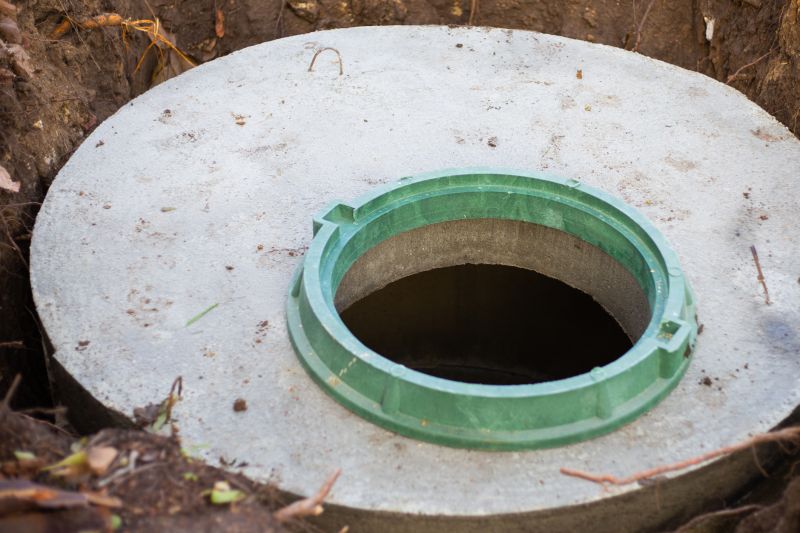Leading Solutions for Septic Baffle Repair Service Tasks
Select from proven products designed to simplify septic baffle repairs and improve overall system performance.
 Septic baffles are essential components within septic tanks, serving to prevent solids from escaping into the drain field and ensuring proper wastewater treatment. Over time, these baffles can deteriorate due to corrosion, cracking, or other structural issues, leading to potential system malfunctions or backups. Repairing or replacing septic baffles is a specialized task that requires appropriate products designed to withstand the harsh conditions inside septic tanks. Selecting the right repair products can help maintain the integrity of the system and prolong its lifespan.
Septic baffles are essential components within septic tanks, serving to prevent solids from escaping into the drain field and ensuring proper wastewater treatment. Over time, these baffles can deteriorate due to corrosion, cracking, or other structural issues, leading to potential system malfunctions or backups. Repairing or replacing septic baffles is a specialized task that requires appropriate products designed to withstand the harsh conditions inside septic tanks. Selecting the right repair products can help maintain the integrity of the system and prolong its lifespan.
Top Overall Option
Septic Tank Baffle Repair Kit
A comprehensive septic tank baffle repair kit typically includes durable plastic or fiberglass replacement baffles, sealing adhesives, and installation tools. Designed to provide a reliable fix for deteriorated or cracked baffles, these kits are suitable for DIY enthusiasts and professionals alike. They offer a straightforward approach to restoring septic tank function and are constructed to withstand the challenging environment inside septic systems.
Types of Products For Septic Baffle Repair Service
Flexible Sealants and Epoxies
Used for sealing cracks and minor damages, these flexible sealants adhere well to tank surfaces and provide a waterproof barrier.
Rigid Plastic Baffles
Replacement baffles made from durable plastic materials designed to withstand septic tank conditions and provide a long-lasting fix.
Fiberglass Baffle Inserts
Fiberglass options offer corrosion resistance and structural strength, suitable for replacing or reinforcing existing baffles.
Baffle Repair Kits
Complete kits containing all necessary components for repairing or replacing septic tank baffles, including adhesives, fittings, and instructions.
PVC Couplings and Adapters
Used to connect or extend existing baffles or piping within the septic tank, ensuring proper alignment and sealing.
Tank Inspection Cameras
Tools for inspecting the interior of septic tanks to assess baffle condition and identify repair needs.
Septic Tank Cleaning Supplies
Products designed to clean and maintain septic tanks, helping prevent buildup that can damage baffles.
Baffle Support Brackets
Reinforcement components that provide additional stability to existing or repaired baffles.
Septic Tank Lid Seals
Sealing products for tank lids that help prevent debris and water intrusion, indirectly supporting baffle integrity.
Corrosion-Resistant Fasteners
Specialized fasteners for securing replacement baffles or repair components in corrosive septic environments.
Popular Choices
A widely used sealant for sealing minor cracks and leaks in septic tank baffles, appreciated for its ease of application.
Popular among DIY homeowners, these kits provide durable plastic baffles and installation accessories for straightforward repairs.
A common choice for reinforcing or replacing damaged baffles, offering resistance to corrosion and long-term durability.
Essential for assessing baffle condition before repair, enabling precise identification of issues.
Used for sealing cracks and small holes, providing a quick fix for minor damage inside septic tanks.
Commonly used for extending or connecting baffle components, ensuring proper flow and sealing.
Popular for maintaining tank health and preventing buildup that could harm baffle integrity.
Help reinforce existing baffles, especially in tanks with extensive deterioration or damage.
Frequently purchased to ensure tank access points remain sealed, indirectly supporting overall system health.
Vital for secure installation of replacement parts in septic environments prone to corrosion.
Various repair solutions are available, ranging from simple sealants and patch kits to more comprehensive replacement parts. When considering repair options, it's important to evaluate the material compatibility, ease of installation, durability, and suitability for the specific septic tank design. Proper repair not only restores the function of the baffles but also helps prevent costly repairs or system failure in the future.
Professional septic service providers often recommend specific products tailored for baffle repair, which may include flexible sealants for minor cracks, rigid plastic or fiberglass baffles for replacement, or specialized adapters and fittings. Ensuring that the chosen products meet industry standards and are compatible with existing tank materials is crucial for a successful repair. Regular inspection and maintenance can also help identify early signs of baffle deterioration, allowing for timely intervention before significant issues arise.
While DIY repairs are possible with the right products and tools, complex or extensive damage should be handled by experienced technicians to ensure proper sealing and structural integrity. Proper product selection, combined with correct installation techniques, can significantly impact the longevity and performance of septic baffle repairs, safeguarding the overall health of the septic system.
Key Buying Considerations
- Compatibility with existing septic tank materials and design.
- Durability and resistance to corrosion or chemical damage in septic environments.
- Ease of installation, especially for DIY repairs.
- Appropriate size and fit for the specific baffle or repair area.
- Type of repair needed—minor crack sealing vs. full replacement.
- Material quality, such as plastic, fiberglass, or epoxy, suited for long-term performance.
- Manufacturer or product standards to ensure reliability.
- Ease of access to the repair site within the tank.
- Availability of support or instructions for installation.
- Cost-effectiveness relative to the extent of damage.
- Environmental conditions of the septic tank location, such as water table or usage level.
- Compatibility with other system components like piping and fittings.
- Potential need for professional assistance for complex repairs.
- Frequency of inspection and maintenance recommended for longevity.
- Availability of replacement parts or repair kits for future needs.
